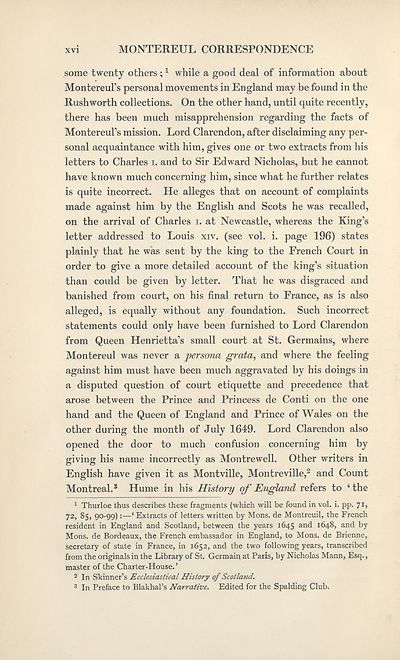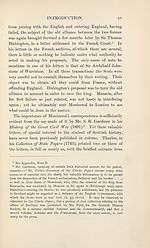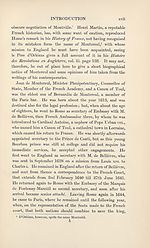Series 1 > Diplomatic correspondence of Jean de Montereul and the brothers de Bellièvre, French ambassadors in England and Scotland, 1645-48 > Volume 1
(21) Page xvi
Download files
Complete book:
Individual page:
Thumbnail gallery: Grid view | List view

XVI
MONTEREUL CORRESPONDENCE
some twenty others ;1 while a good deal of information about
Montereul’s personal movements in England may be found in the
Rushworth collections. On the other hand, until quite recently,
there has been much misapprehension regarding the facts of
Montereul’s mission. Lord Clarendon, after disclaiming any per¬
sonal acquaintance with him, gives one or two extracts from his
letters to Charles i. and to Sir Edward Nicholas, but he cannot
have known much concerning him, since what he further relates
is quite incorrect. He alleges that on account of complaints
made against him by the English and Scots he was recalled,
on the arrival of Charles i. at Newcastle, whereas the King’s
letter addressed to Louis xiv. (see vol. i. page 196) states
plainly that he was sent by the king to the French Court in
order to give a more detailed account of the king’s situation
than could be given by letter. That he was disgraced and
banished from court, on his final return to France, as is also
alleged, is equally without any foundation. Such incorrect
statements could only have been furnished to Lord Clarendon
from Queen Henrietta’s small court at St. Germains, where
Montereul was never a persona grata, and where the feeling
against him must have been much aggravated by his doings in
a disputed question of court etiquette and precedence that
arose between the Prince and Princess de Conti on the one
hand and the Queen of England and Prince of Wales on the
other during the month of July 1649. Lord Clarendon also
opened the door to much confusion concerning him by
giving his name incorrectly as Montrewell. Other writers in
English have given it as Montville, Montreville,2 and Count
Montreal.3 Hume in his History of England refers to ‘the
1 Thurloe thus describes these fragments (which will be found in vol. i. pp. 71,
72, 85, 90-99):—‘ Extracts of letters written by Mons. de Montreuil, the French
resident in England and Scotland, between the years 1645 and 1648, and by
Mons. de Bordeaux, the French embassador in England, to Mons. de Brienne,
secretary of state in France, in 1652, and the two following years, transcribed
from the originals in the Library of St. Germain at Paris, by Nicholas Mann, Esq.,
master of the Charter-House. ’
2 In Skinner’s Ecclesiastical History of Scotland.
3 In Preface to Blakhal’s Narrative. Edited for the Spalding Club.
MONTEREUL CORRESPONDENCE
some twenty others ;1 while a good deal of information about
Montereul’s personal movements in England may be found in the
Rushworth collections. On the other hand, until quite recently,
there has been much misapprehension regarding the facts of
Montereul’s mission. Lord Clarendon, after disclaiming any per¬
sonal acquaintance with him, gives one or two extracts from his
letters to Charles i. and to Sir Edward Nicholas, but he cannot
have known much concerning him, since what he further relates
is quite incorrect. He alleges that on account of complaints
made against him by the English and Scots he was recalled,
on the arrival of Charles i. at Newcastle, whereas the King’s
letter addressed to Louis xiv. (see vol. i. page 196) states
plainly that he was sent by the king to the French Court in
order to give a more detailed account of the king’s situation
than could be given by letter. That he was disgraced and
banished from court, on his final return to France, as is also
alleged, is equally without any foundation. Such incorrect
statements could only have been furnished to Lord Clarendon
from Queen Henrietta’s small court at St. Germains, where
Montereul was never a persona grata, and where the feeling
against him must have been much aggravated by his doings in
a disputed question of court etiquette and precedence that
arose between the Prince and Princess de Conti on the one
hand and the Queen of England and Prince of Wales on the
other during the month of July 1649. Lord Clarendon also
opened the door to much confusion concerning him by
giving his name incorrectly as Montrewell. Other writers in
English have given it as Montville, Montreville,2 and Count
Montreal.3 Hume in his History of England refers to ‘the
1 Thurloe thus describes these fragments (which will be found in vol. i. pp. 71,
72, 85, 90-99):—‘ Extracts of letters written by Mons. de Montreuil, the French
resident in England and Scotland, between the years 1645 and 1648, and by
Mons. de Bordeaux, the French embassador in England, to Mons. de Brienne,
secretary of state in France, in 1652, and the two following years, transcribed
from the originals in the Library of St. Germain at Paris, by Nicholas Mann, Esq.,
master of the Charter-House. ’
2 In Skinner’s Ecclesiastical History of Scotland.
3 In Preface to Blakhal’s Narrative. Edited for the Spalding Club.
Set display mode to:
![]() Universal Viewer |
Universal Viewer | ![]() Mirador |
Large image | Transcription
Mirador |
Large image | Transcription
Images and transcriptions on this page, including medium image downloads, may be used under the Creative Commons Attribution 4.0 International Licence unless otherwise stated. ![]()
| Permanent URL | https://digital.nls.uk/127021701 |
|---|
| Shelfmark | SCS.SHS.29 |
|---|---|
| Attribution and copyright: |
|
| Attribution and copyright: |
|
|---|
| Description | Over 180 volumes, published by the Scottish History Society, containing original sources on Scotland's history and people. With a wide range of subjects, the books collectively cover all periods from the 12th to 20th centuries, and reflect changing trends in Scottish history. Sources are accompanied by scholarly interpretation, references and bibliographies. Volumes are usually published annually, and more digitised volumes will be added as they become available. |
|---|


